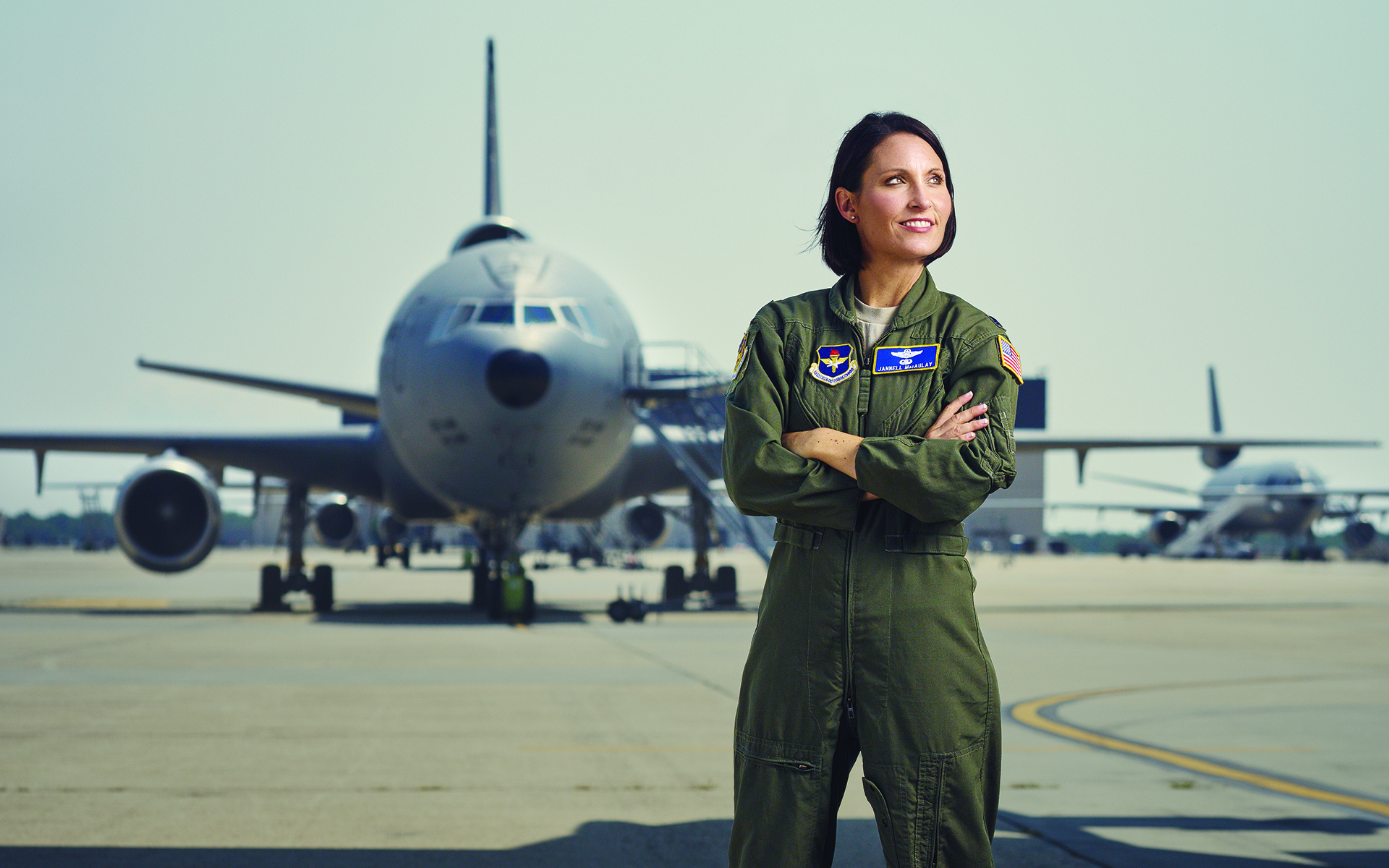Jannell MacAulay knows a thing or two about the hard-driving life. A combat veteran and former commander with over 3,000 flying hours, MacAulay served in the US Air Force for 20 years before retiring in June 2018. But her hard work and ambition eventually led to burnout. 14 years into her career, she began doctoral studies on human performance and encountered self-care practices like yoga and mindfulness. What began as academic research soon became a personal practice and, ultimately, a professional crusade: She brought mindfulness to her squadron and then to some 2,500 members of the 58th Special Operations Wing at Kirtland Air Force Base in New Mexico.
Do you remember your earliest encounter with yoga or mindfulness?
Around 1999, I took my first yoga class, and I didn’t like it. My mind didn’t stop moving—it just kept accelerating through my worries, my to-do list. I felt that slowing down with yoga would be detrimental to my performance.
You were more comfortable with hard work?
My parents—my dad, a retired police lieutenant, in particular—instilled in me a drive for hard work. My father used to tell people I was going to be a submarine warfare commander or a fighter pilot. In the 1980s those jobs weren’t open to women, but I had no idea about limits. I just knew that if I worked hard enough I could achieve my dreams.
And that approach worked—until it didn’t?
That message from my parents was incomplete. Somebody looking at me from the outside might have thought, “Man, she’s successful.” But inside I was really struggling.
What happened?
My husband was on a one-year deployment in the Middle East. We had a two-year-old daughter, a house, a dog. And I was responsible for a flight-training unit. I was trying to be perfect and I was completely burned out. I had been flying for 13 years, but I still hadn’t realized that I needed to secure my own oxygen mask first.
When the Air Force sent me back to school for two years, I started studying how we can perform better under high-stress situations, like combat. The research was compelling, and the idea of slowing down to speed up intrigued me. Mindfulness became my oxygen mask.
The idea of slowing down seems antithetical to the military mindset.
In a culture like the military, no one wants to be told, “Hey, you need help.” When I was in that go-go-go mentality, I know I didn’t want to hear, “You need help slowing down.” People would say that I was making my unit weak or “just making people feel good.”
My answer was “Is there a problem with making people feel good? If they feel good, they’re going to perform better.” So I focus my message on performance. We all can use more tools and resources to get better at what we do. Mindfulness is another resource to make you even more badass or more high-performing than you already are. That resonates with people.
We all can use more tools and resources to get better at what we do. Mindfulness is another resource to make you even more badass or more high-performing than you already are.
How did you introduce mindfulness to your squadron?
I started by just exemplifying the behaviors of a mindful leader—someone who took care of herself, who was present in conversation. Eventually, we began to meditate at our monthly commanders calls and weekly leadership meetings. As a squadron, we practiced together once a month and, for people who saw me more often, once a week.
How can mindfulness help performance?
Maybe a student pilot doesn’t have the best landing. The student takes off again and comes back around for the next one. As the instructor, I can tell if the student is still thinking about the previous landing. If they can’t get that first landing out of their head, the second landing won’t go well. You need a skill to help you recover. That’s what mindfulness does: It brings our awareness back to the moment so we can perform at a high level, despite the mistakes we made two minutes earlier.
What will you do now that you’ve retired from the military?
The number one thing is being more present with my two young children and my husband. And I’ll be consulting with the Air Force and other organizations on performance-related programs. I am passionate about building a culture that’s more focused on performance and that recognizes mindfulness as a performance-enhancing tool. I’m also passionate about integrating self-care into our leadership model.





